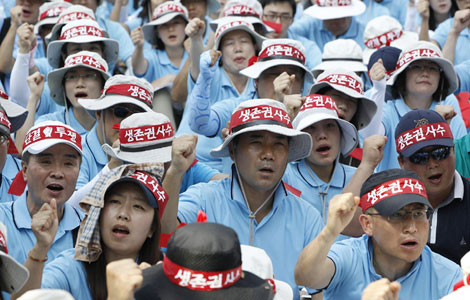China thwarts 'sabotage attempts' in Urumqi
Updated: 2011-08-31 20:15
(Xinhua)
|
|||||||||||
URUMQI - Police have thwarted several attempts to sabotage public safety in the run-up to a state-level international trade fair to be held in the country's restive northwest, a senior local official said.
Zhu Hailun, the top official of Urumqi in Xinjiang Uygur Autonomous Region, told reporters on Wednesday, one day before the opening of the China-Eurasia Expo, that separatists, religious extremists and terrorists have been plotting to sabotage the expo.
He confirmed that airport security staff in Urumqi on August 7 arrested a man who attempted to take a knife on board. He has been detained on the suspicion of planning to carry out an attack during the flight.
"There have been many similar cases of attacks being blocked by police," Zhu said. "Hopefully we have intervened in time to nib the violence in the bud."
Authorities have boosted security in Urumqi in the run-up to the first China-Eurasia Expo. Airports in a dozen cities, including Beijing and Shanghai, have tightened security screenings for Urumqi-bound flights since Sunday. Passengers are asked to remove their shoes and let their carry-on luggage be opened and searched.
Fully-armed police are guarding the convention venue located in suburban Urumqi while armored vehicles are parked in front of high-end hotels where the dignitaries are staying.
Thursday's opening will be attended by foreign leaders including Pakistani President Asif Ali Zardari, Kyrgyz President Roza Otunbayeva, Azerbaijan's Vice Premier Abid Sharifov, and Kazakhstan's Deputy Prime Minister Aset Isekeshev, Chinese Foreign Ministry spokesman Ma Zhaoxu said.
The expo was upgraded from the China Urumqi Foreign Economic Relations and Trade Fair, a regional trade fair, last year. Organizers said the upgrade will make Urumqi an important exchange platform for leaders and businesses in China and its western and southern neighbors, such as Russia, Kazakhstan and Pakistan.
In his a meeting with Xinjiang's top official Zhang Chunxian on Tuesday, Zardari reassured Chinese officials that Islamabad opposes any kind of terrorist activities and will work more closely with China to fight cross-border terrorist groups.
The increased security comes amid a two-month crackdown on terrorism ordered by regional authorities earlier this month following an outbreak of violence in Xinjiang's major southern cities, Kashgar and Hotan, that left at least 40 dead and dozens injured.
Kashgar officials blamed Islamic radicals trained in overseas terrorist camps for masterminding the attacks.
Zhu Hailun said Urumqi officials were "very concerned" and felt a huge challenge after violence broke out in the two southern cities.
The hostile forces want to deter China's development, and they view Xinjiang as the ideal place to launch sabotage activities, Zhu said. "We must always stay vigilant and have a clear understanding of the security situation."
Xinjiang, located in a volatile region, has been battling separatism, extremism and terrorism for decades. About 41.5 percent of Xinjiang's 21 million population are Uygurs, a largely Muslim ethnic group, and security experts worry that the growing religious extremism in the region has fanned most of the violent attacks.
During Xinjiang's most deadly unrest in decades, 197 people were killed and about 1,700 others injured in the July 2009 riot.
Zhu, who was appointed to Urumqi's top post after the riot, said tremendous efforts have been made to root out stability threats in the city with a severe crackdown on violent groups and a boost of security forces in the communities.
Since then the city has employed 20,000 community workers to provide everyday services and prevent violence at the grassroots level. Each of the city's 550 communities has an annual budget of 160,000 yuan ($24,800) for their work, the official said.
"With the policy, we are able to handle any kind of emergencies immediately, preventing the violence from spreading and the mob from growing," he added.
Zhu said maintaining stability is Xinjiang's local governments' primary challenge. With violence checked, the region can seize development opportunities and greatly raise the living standards of local residents.
"Overall stability results in overall development, and long-term stability results in long-term growth -- that is Xinjiang's reality," Zhu said.
Hot Topics
Li Na FIFA Novak Djokovic Liu Xiang Tiger Woods Yao Ming Rafa Nadal Ding Junhui Dirk Nowitzki Lin Dan Lionel Messi Sang Lan Maria Sharapova Wimbledon Barcelona
Editor's Picks

|

|

|

|

|

|






